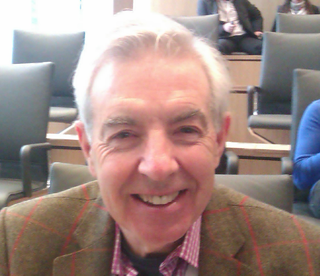Related Research Articles
Psychosis is a condition of the mind that results in difficulties determining what is real and what is not real. Symptoms may include delusions and hallucinations, among other features. Additional symptoms are incoherent speech and behavior that is inappropriate for a given situation. There may also be sleep problems, social withdrawal, lack of motivation, and difficulties carrying out daily activities. Psychosis can have serious adverse outcomes.

Schizophrenia is a brain disorder characterized by reoccurring episodes of psychosis that are correlated with a general misperception of reality. Other common signs include hallucinations, delusions, disorganized thinking, social withdrawal, and flat affect. Symptoms develop gradually and typically begin during young adulthood and are never resolved. There is no objective diagnostic test; diagnosis is based on observed behavior, a psychiatric history that includes the person's reported experiences, and reports of others familiar with the person. For a diagnosis of schizophrenia, the described symptoms need to have been present for at least six months or one month. Many people with schizophrenia have other mental disorders, especially substance use disorders, depressive disorders, anxiety disorders, and obsessive–compulsive disorder.
Richard Bentall is a Professor of Clinical Psychology at the University of Sheffield in the UK.
Professor Christos Pantelis is an Australian professor of medicine who is the Director of the Melbourne Neuropsychiatry Centre.

Sir Robin MacGregor Murray FRS is a Scottish psychiatrist, Professor of Psychiatric Research at the Institute of Psychiatry, King's College London. He has treated patients with schizophrenia and bipolar illness referred to the National Psychosis Unit of the South London and Maudsley NHS Trust because they fail to respond to treatment, or cannot get appropriate treatment, locally; he sees patients privately if they are unable to obtain an NHS referral.
Schizophrenics Anonymous is a peer support group to help people who are affected by schizophrenia and related disorders including bipolar disorder, schizoaffective disorder, psychotic depression and psychosis.
Gordon Sidney Claridge was a British psychologist and author, best known for his theoretical and empirical work on the concept of schizotypy or psychosis-proneness.
Risk factors of schizophrenia include many genetic and environmental phenomena. The prevailing model of schizophrenia is that of a special neurodevelopmental disorder with no precise boundary or single cause. Schizophrenia is thought to develop from very complex gene–environment interactions with vulnerability factors. The interactions of these risk factors are intricate, as numerous and diverse medical insults from conception to adulthood can be involved. The combination of genetic and environmental factors leads to deficits in the neural circuits that affect sensory input and cognitive functions. Historically, this theory has been broadly accepted but impossible to prove given ethical limitations. The first definitive proof that schizophrenia arises from multiple biological changes in the brain was recently established in human tissue grown from patient stem cells, where the complexity of disease was found to be "even more complex than currently accepted" due to cell-by-cell encoding of schizophrenia-related neuropathology.
In medicine, a prodrome is an early sign or symptom that often indicates the onset of a disease before more diagnostically specific signs and symptoms develop. It is derived from the Greek word prodromos, meaning "running before". Prodromes may be non-specific symptoms or, in a few instances, may clearly indicate a particular disease, such as the prodromal migraine aura.
Early intervention in psychosis is a clinical approach to those experiencing symptoms of psychosis for the first time. It forms part of a new prevention paradigm for psychiatry and is leading to reform of mental health services, especially in the United Kingdom and Australia.
Barbara A. Cornblatt is Professor of Psychiatry and Molecular Medicine at Hofstra Northwell School of Medicine. She is known for her research on serious mental disorders, with a specific focus on psychosis and schizophrenia. Her efforts to find treatments to help youth with mental illness led to the development of the Recognition and Prevention Program, which she founded in 1998.

Patrick Dennistoun McGorry is an Irish-born Australian psychiatrist known for his development of the early intervention services for emerging mental disorders in young people.
Sex differences in schizophrenia are widely reported. Men and women exhibit different rates of incidence and prevalence, age at onset, symptom expression, course of illness, and response to treatment. Reviews of the literature suggest that understanding the implications of sex differences on schizophrenia may help inform individualized treatment and positively affect outcomes.
Patricia Therese Michie is Emeritus Professor of Psychology, and co-director of the Schizophrenia Program of the Priority Research Centre in Translational Neuroscience and Mental Health at the University of Newcastle.

Mary Cannon is an Irish psychiatrist, research scientist, public figure, and former member of the Cannabis Risk Alliance. She has received the Royal Academy of Medicine in Ireland's "Doctors Award" for psychiatry and is among the most highly cited scientists in the world. Cannon is known for her views on cannabis, being described as 'anti-cannabis'. She is best known in the field of psychiatry for her study of the risk factors for mental illness in young people.

Basic symptoms of schizophrenia are subjective symptoms, described as experienced from a person's perspective, which show evidence of underlying psychopathology. Basic symptoms have generally been applied to the assessment of people who may be at risk to develop psychosis. Though basic symptoms are often disturbing for the person, problems generally do not become evident to others until the person is no longer able to cope with their basic symptoms. Basic symptoms are more specific to identifying people who exhibit signs of prodromal psychosis (prodrome) and are more likely to develop schizophrenia over other disorders related to psychosis. Schizophrenia is a psychotic disorder, but is not synonymous with psychosis. In the prodrome to psychosis, uncharacteristic basic symptoms develop first, followed by more characteristic basic symptoms and brief and self-limited psychotic-like symptoms, and finally the onset of psychosis. People who were assessed to be high risk according to the basic symptoms criteria have a 48.5% likelihood of progressing to psychosis. In 2015, the European Psychiatric Association issued guidance recommending the use of a subscale of basic symptoms, called the Cognitive Disturbances scale (COGDIS), in the assessment of psychosis risk in help-seeking psychiatric patients; in a meta-analysis, COGDIS was shown to be as predictive of transition to psychosis as the Ultra High Risk (UHR) criteria up to 2 years after assessment, and significantly more predictive thereafter. The basic symptoms measured by COGDIS, as well as those measured by another subscale, the Cognitive-Perceptive basic symptoms scale (COPER), are predictive of transition to schizophrenia.

Paolo Fusar-Poli is an Italian and British medical doctor, psychiatrist, and Professor at the Institute of Psychiatry, Psychology and Neuroscience, King's College, London and at the Department of Brain and Behavioral Sciences, University of Pavia.
Diana O. Perkins is an American professor at the University of North Carolina's (UNC) School of Medicine where she teaches psychiatry; she is a fellow with outreach roles. Her research involves early diagnosis and treatment of schizophrenia. She is noted for publishing a study that demonstrated that using a polygenic risk score (PRS) based on data from genome-wide association studies improved the psychosis risk prediction in persons meeting clinical high-risk criteria.

Gemma Modinos, born 1980 in Castellar del Vallès, is a Spanish neuropsychologist. She works as a Reader of Neuroscience and Mental Health at the Institute of Psychiatry, Psychology and Neuroscience of King's College London. She was a Wellcome Trust & The Royal Society Sir Henry Dale Fellow (2017-2023) and is a Group leader at the MRC Centre for Neurodevelopmental Disorders at King's College London. She was 2020-2022 Chair of the Young Academy of Europe, where she directed European efforts to optimise science policy from a youthful perspective; and 2020-2022 Junior Member of the Executive Board of the Schizophrenia International Research Society. She is known for her work revealing the role of emotion-related brain mechanisms and the neurotransmitters GABA and glutamate in the development of psychosis, and investigating how targeting these mechanisms can help design new therapeutic strategies.
Carrie Elyse Bearden is an American psychologist and academic. She is a professor at the David Geffen School of Medicine, University of California, Los Angeles, and Director of the UCLA Center for the Assessment and Prevention of Prodromal States, a clinical research program for youth at high risk for psychotic disorders. She is most known for her research taking a ‘genetics first’ approach to study brain mechanisms underlying the development of serious mental illness. Her work has identified biological convergence between genetically and clinically defined high-risk populations.
References
- 1 2 "Home". jeanaddington.com. Retrieved April 9, 2023.
- 1 2 "University of Calgary - Schizophrenia researcher inducted into Royal Society of Canada".
- ↑ "Jean Addington". June 24, 2019.